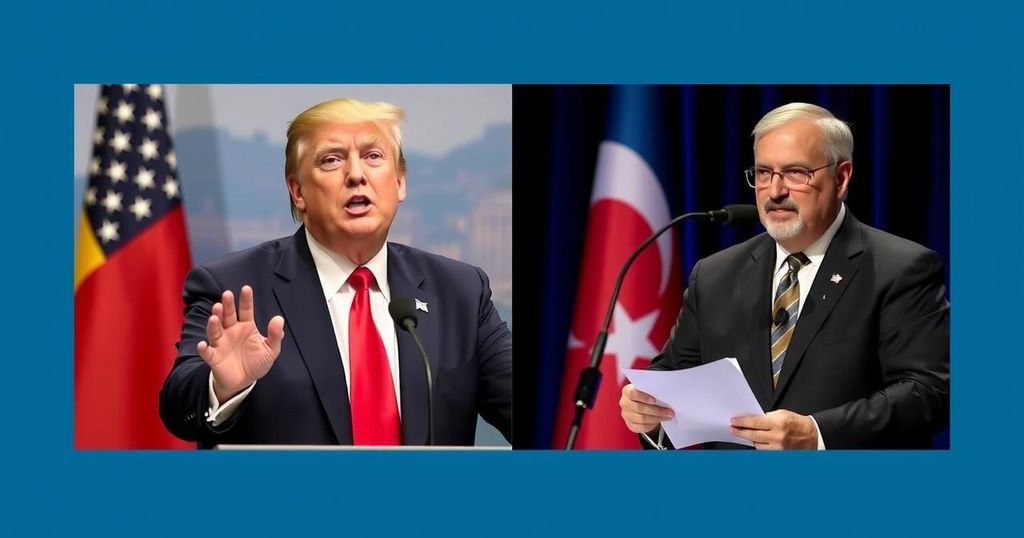Global news
AFGHANISTAN, ANTONY BLINKEN, APA, ARMENIA, ASIA, AZERBAIJAN, AZERBAIJANI PRESS AGENCY, BAKU, BIDEN, COLOMBIA, EUROPE/ASIA, FOREIGN POLICY, INTERNATIONAL RELATIONS, JAMES O ’ BRIEN, NAGORNO - KARABAKH, NATIONAL SECURITY, NORTH AMERICA, OSCE COUNCIL OF FOREIGN MINISTERS, SANCTIONS, SOUTH AMERICA, TRUMP, UNITED STATES, WASHINGTON
Marcus Li
0 Comments
Trump’s Potential Impact on U.S.-Azerbaijan Relations
This article discusses recent tensions in U.S.-Azerbaijan relations stemming from the Biden administration’s policies and sanctions that have frustrated Azerbaijani leaders. Azerbaijan’s refusal to engage in U.S.-mediated peace talks with Armenia marks a notable shift, with leaders hoping for a more favorable partnership under a potential Trump presidency. The article stresses the importance of pragmatic diplomacy in navigating these complex relations moving forward.
On December 5th, the Azerbaijani Press Agency (APA) reported that Azerbaijan’s Foreign Minister declined a U.S.-organized meeting with Armenia’s Foreign Minister during the 31st OSCE Council of Foreign Ministers event in Malta. The refusal, attributed to the alleged biases of the Biden administration, marks a notable shift as Azerbaijan has previously engaged in U.S.-mediated peace initiatives. Diplomatic sources signal a clear discontent with the current U.S. approach, particularly the perceived inequity stemming from sanctions imposed under the 907 amendment of the Freedom Support Act, which restricts Azerbaijani assistance unless it halts aggression toward Armenia.
Relations between Baku and Washington have deteriorated significantly, particularly following the Biden administration’s decision to cancel longstanding waivers on these sanctions, citing insufficient progress in peace negotiations. Azerbaijan’s consistent demand for the removal of Armenia’s territorial claims from its constitution stands as a significant roadblock to peace, even as calls for increased sanctions against Azerbaijan persist.
Amidst this backdrop, President Aliyev has expressed his frustrations with U.S. demands, indicating a preference for working with Republican administrations, which he believes have provided more fruitful cooperation. The anticipation of Donald Trump resuming the presidency raises questions about a potential recalibration of U.S.-Azerbaijan relations. Observers speculate that Trump’s return could foster a more productive partnership, as Baku hopes for a more favorable political climate under his leadership, contrasting sharply with recent U.S. foreign policy actions.
While optimism prevails in Baku about the prospects of renewed cooperation, the volatile geopolitical landscape necessitates caution. Both Azerbaijan and the United States share a vested interest in strengthening ties in order to promote stability and pragmatic diplomacy, irrespective of leadership transitions. There is a mutual understanding that improved partnerships can yield significant benefits for both nations.
The relations between Azerbaijan and the United States have historically fluctuated, with recent developments reflecting a significant strain attributed to U.S. foreign policy under the Biden administration. The implementation of sanctions under the 907 amendment has resulted in Azerbaijan perceiving the American approach as overly transactional and biased. Additionally, the refusal of Azerbaijan to engage in U.S.-mediated peace talks with Armenia has raised concerns about the future of diplomatic relations, especially in light of the upcoming Trump presidency, which some in Azerbaijan view with cautious optimism. This context is crucial for understanding the complexities of U.S.-Azerbaijan relations going forward.
In conclusion, the evolving dynamics of U.S.-Azerbaijan relations reflect deeper geopolitical tensions and differing diplomatic priorities. Azerbaijan’s recent rejection of U.S. mediation underscores a growing discontent with American policies perceived as unjust. The prospective Trump administration may present an opportunity for a renewed partnership, yet the realities of the region’s political landscape demand cautious optimism. Both nations must strive to rebuild their cooperation, focusing on mutual interests and pragmatic diplomacy to foster stability in the South Caucasus.
Original Source: www.commonspace.eu




Post Comment